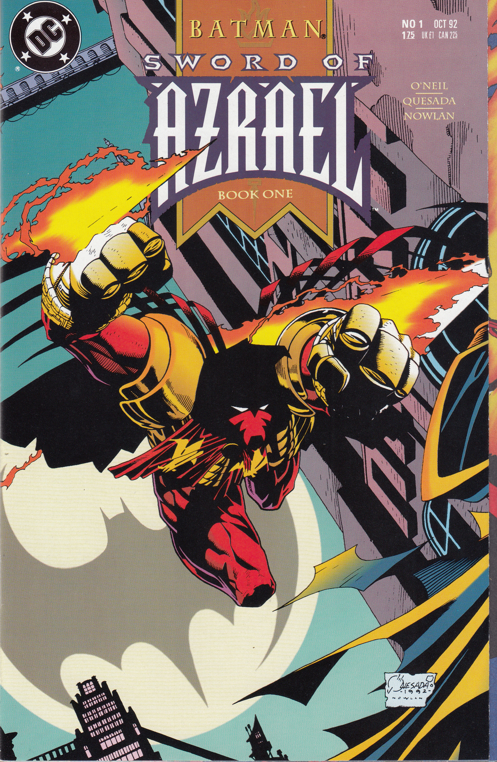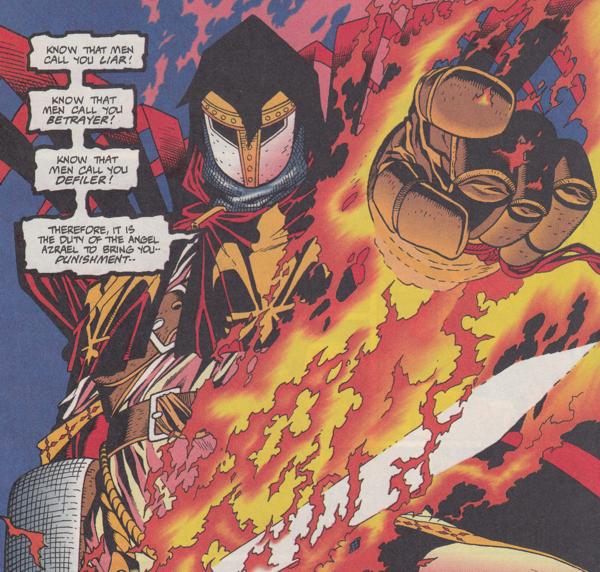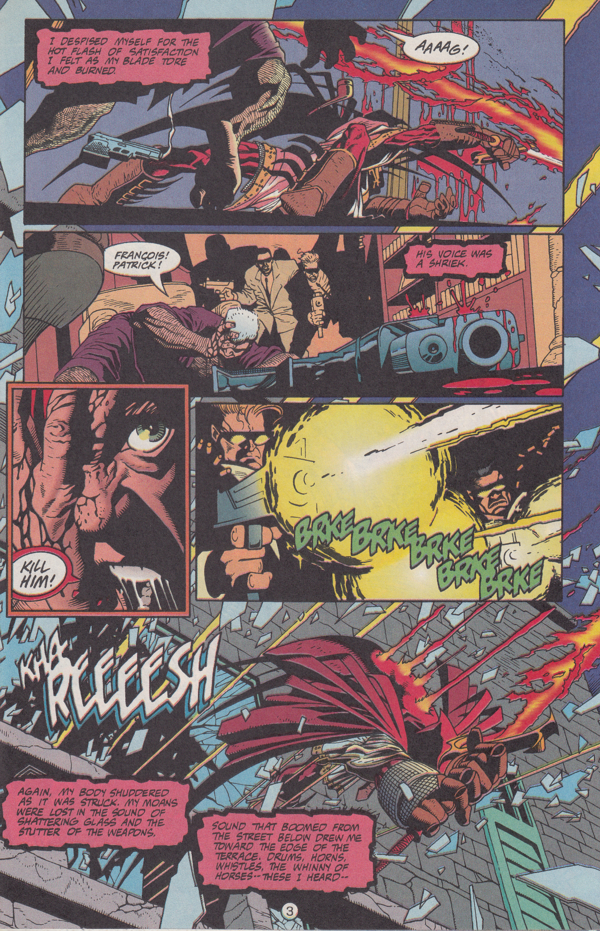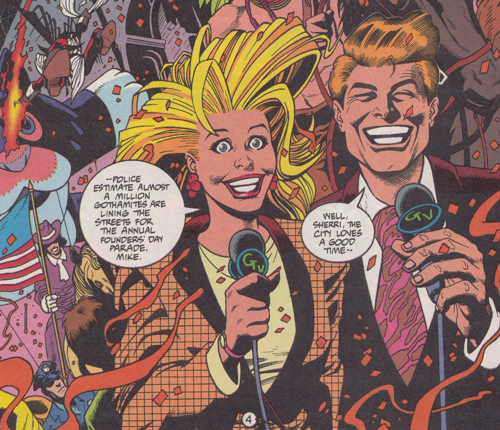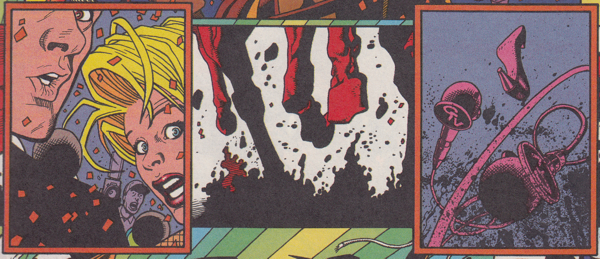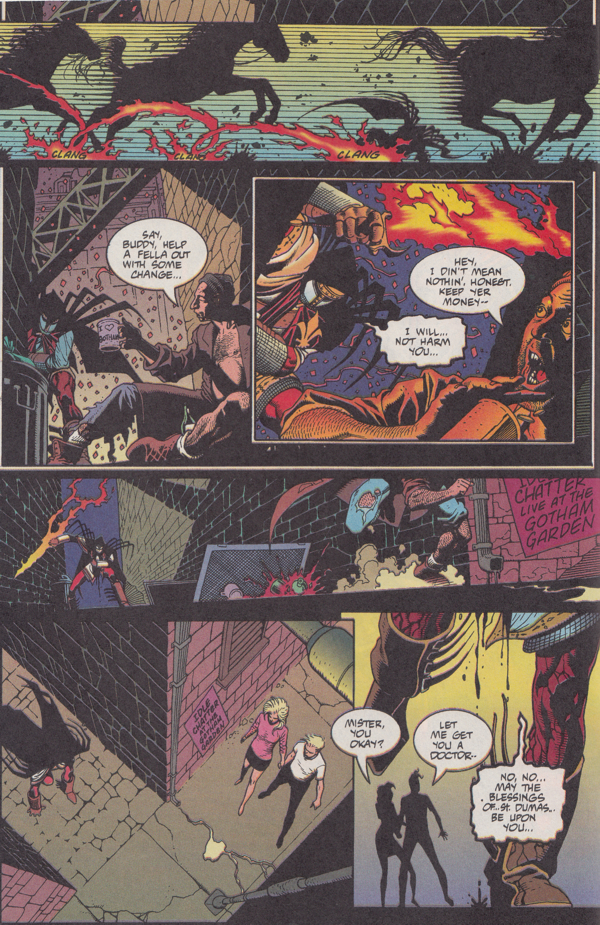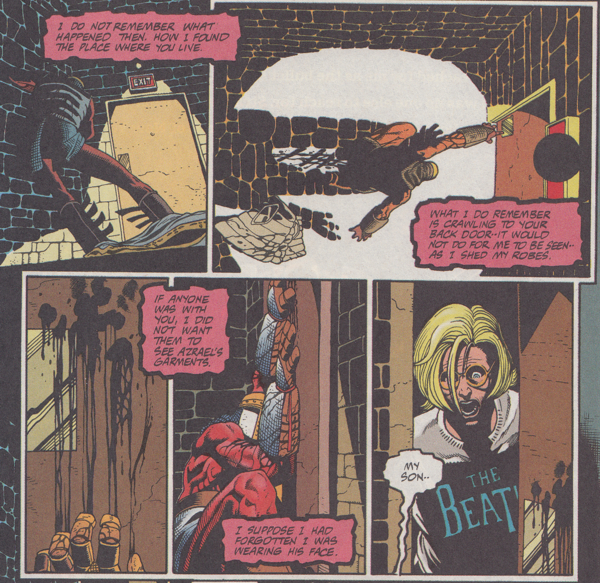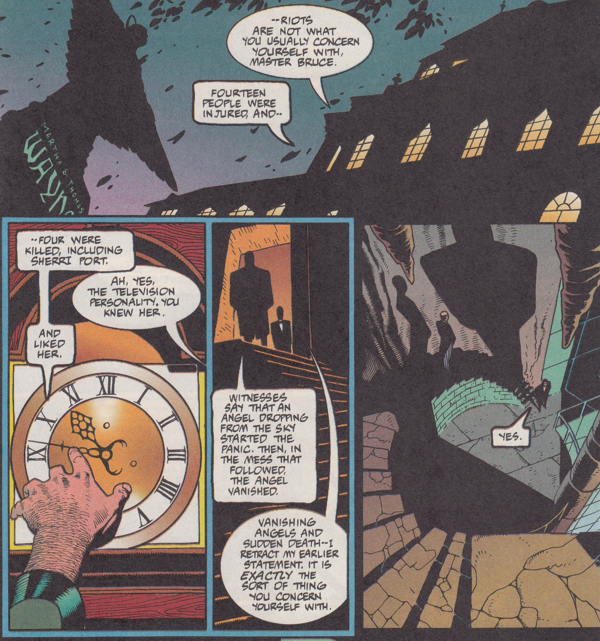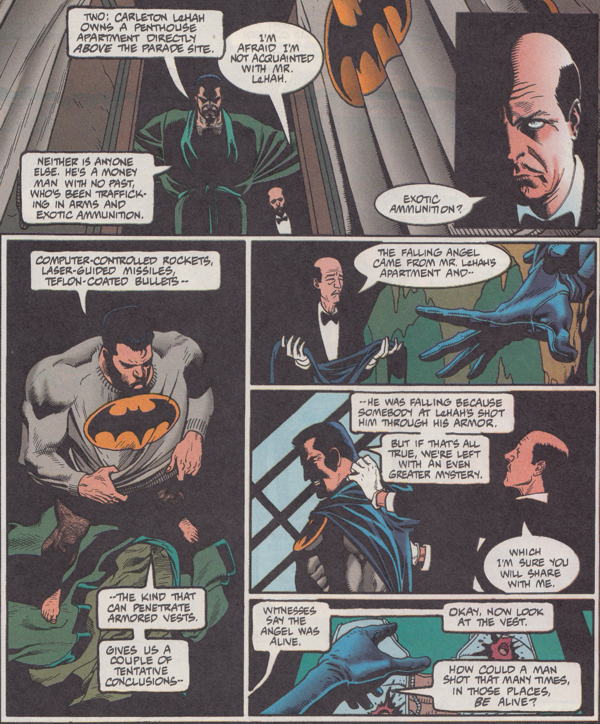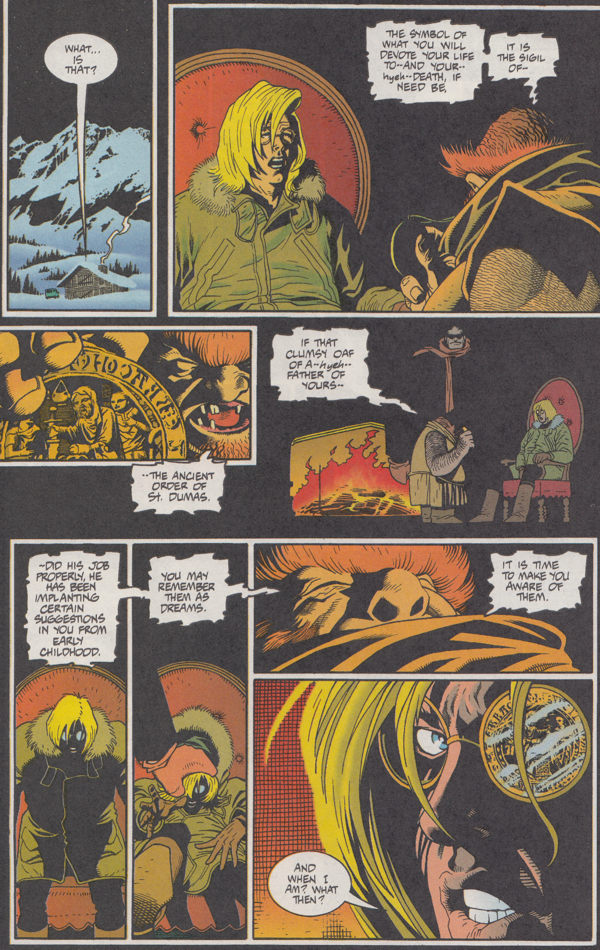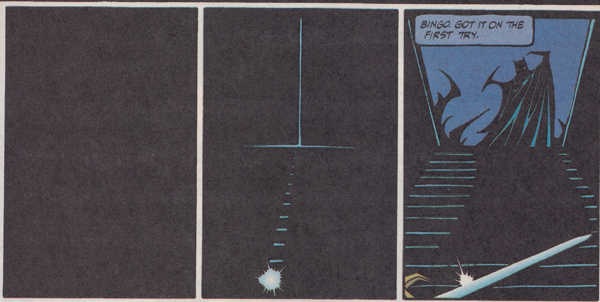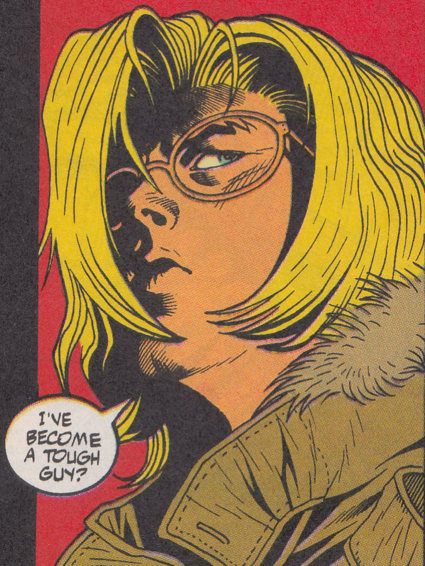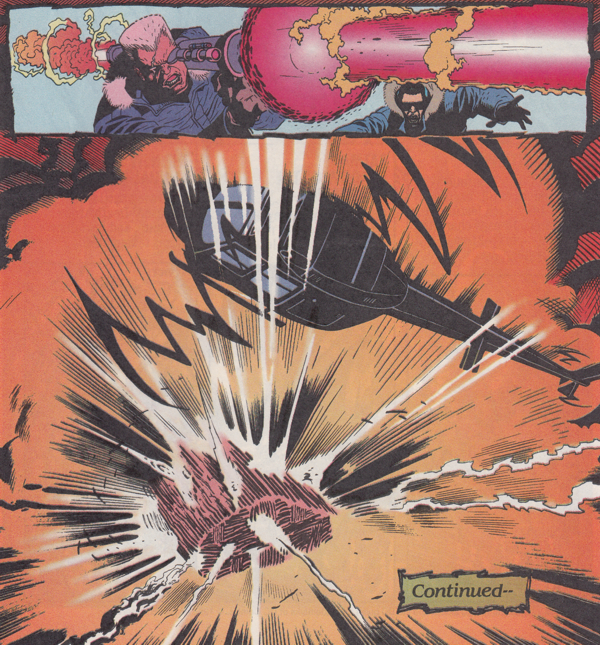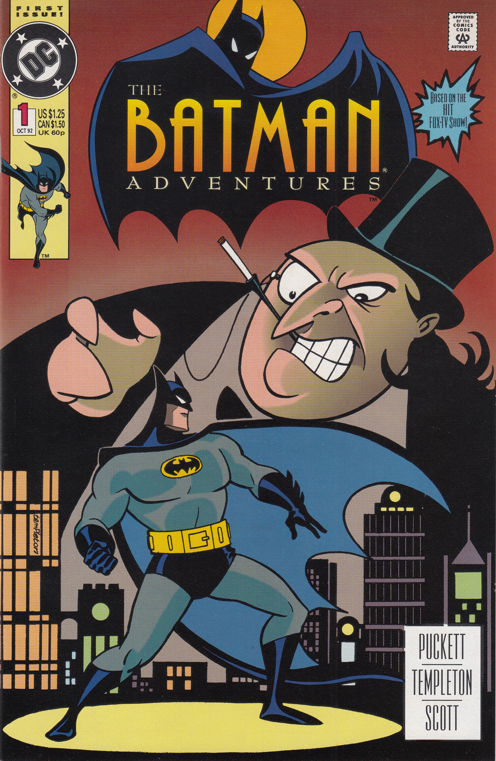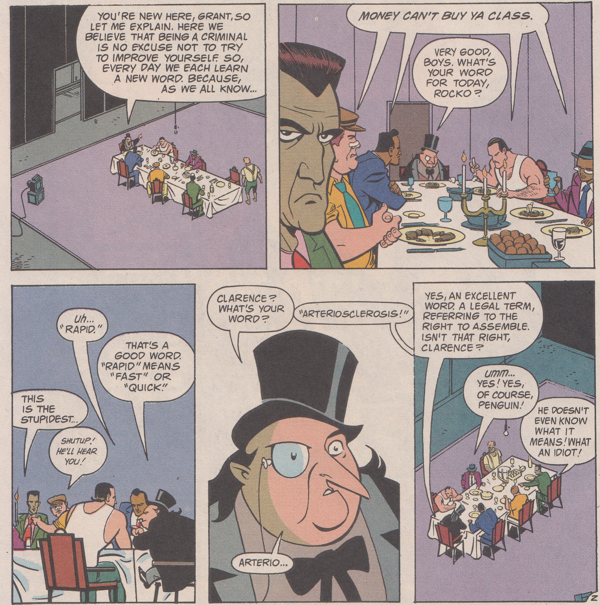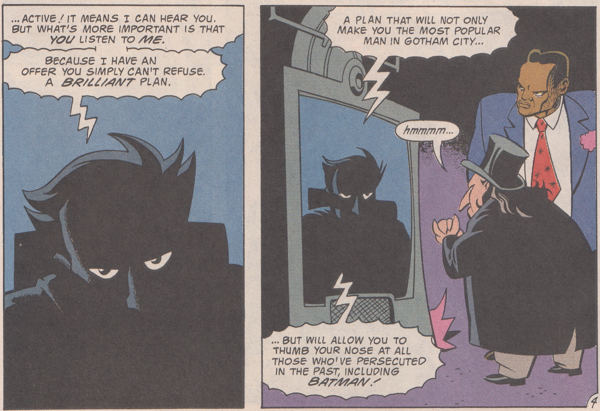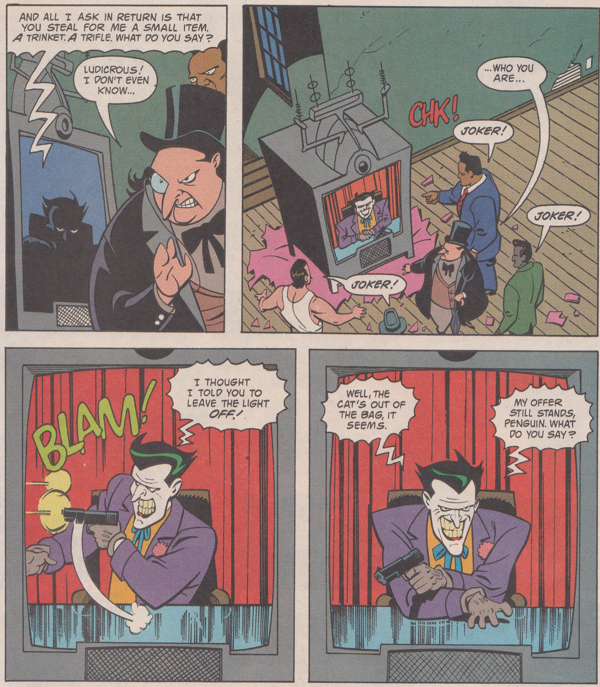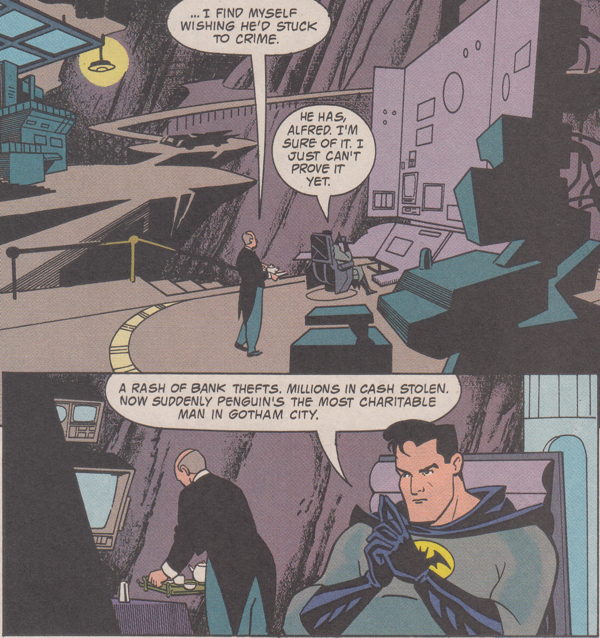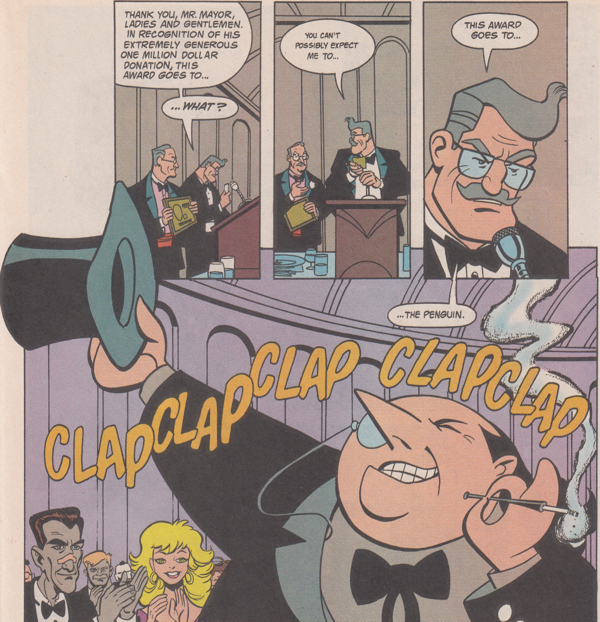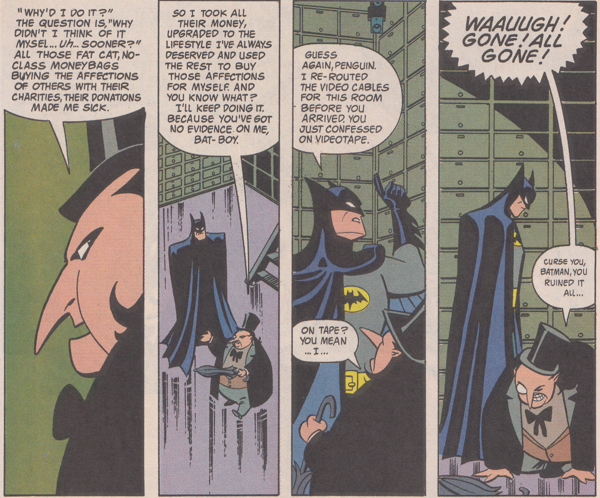 This feels like I'm about to read an encyclopedia cover to cover. But one written by Marv Wolfman.
This feels like I'm about to read an encyclopedia cover to cover. But one written by Marv Wolfman.Apparently New History of the DC Universe just came out so I should probably read that and throw this one in the garbage. Will this be like reading Charlie Brown's Super Book of Questions and Answers from 1976 and realizing that half the answers are wrong now? Or, to be fair to Charlie Brown, more fleshed out and understood. I believe in the Charlie Brown book, one of the questions is what killed the dinosaurs and the answer doesn't even mention the possibility of an asteroid hitting the Earth. Wait, I have it right here! Let's read the answer together!
 Not really, Patty. Some dinosaurs still exist. Like Republicans and your mom.
Not really, Patty. Some dinosaurs still exist. Like Republicans and your mom.I remember reading a book on Luis Walter Alvarez's asteroid hypothesis in high school (on my own! It wasn't an assignment!), probably 1985 or 1986. Big discrepancies in scientific knowledge like this often cause dolts who believe in "common sense" and "gut instincts" to scoff at anything scientists do. But that's because they don't understand the difference between a hypothesis or a theory or a Theory. It's hard to explain it to them but maybe if you say something like, "You know how seeing your brother do ballet makes you think he's gay? That's a hypothesis! Now you have to run experiments to see if evidence backs up your hypothesis, like throwing dicks at him and seeing if he puts them in his mouth or his butt. If he does it often enough, you could probably up it to a theory. But you probably can't call it a Theory until he looks you in the eye and says, 'God how I love guzzling semen!'" Or something. I don't know! I'm stupid!
What I'm trying to get at is that this History of the DC Universe was written just after Crisis on Infinite Earths so I'm guessing it explains the new, at the time, history of the DC Universe based on the events of Crisis. So I doubt Wolfman will have a section where he explains Infinity, Inc or Power Girl. Best to just ignore that shit. Also, this is pre-Zero Hour so I probably could have binned this shit thirty years ago!
Let's see how much I know about DC's history based on the cover by guessing all the characters in the letters!
H: Darkseid.
I: Uncle Sam of the Freedom Fighters.
S: King Solovar of Gorilla City with Grodd plotting behind him.
T: Baby Kal-El's rocket ship.
O: Amazing Man whom I only really know from DC's Who's Who.
R: Etrigan the Demon.
Y: No idea. A Lazarus Pit?
OF: Hourman.
THE: The Blackhawks? With some other nerd?
DC: Black Condor of the Freedom Fighters.
U: Abnegezer, Rath, and, um, Nikto?
N: Jonah Hex.
I: Some incarnation of Vandal Savage?
V: Broot? Was that a guy? One of them aliens from the Vega system?
E: Hawkman.
R: Starfire and some other Tamaraneans.
S: The bombing of Dresden!
E: Um, uh, Nathaniel Dusk?
And that's the history of the DC Universe! Thank you and goodnight!
Oh shit. Forget that. There's like forty-eight more pages in just this first book! It's a history of the universe as written by Harbinger, seemingly the only person left in the DC Universe who remembers the Multiverse. So maybe there will be a chapter on Infinity, Inc. I can already tell her history's going to be incorrect because she's going to mention Krona gazing on the beginning of the universe and as we've seen in Ganthet's Tale, that didn't really happen the way everybody thinks it happened. So maybe I should have thrown this book in the garbage around 1992! Judging DC's history of trying to fix their history only to make things way more complicated, perhaps I should have paid for this book at the counter of Brian's Books, walked outside, and tossed it in a trash can. But I'm sure the New History of the DC Universe finally got it all down correctly!
Harbinger begins by explaining how God ejaculated and his seed flew across the vacuum of space to become billions of different civilizations. She then goes on to describe those civilizations in as detailed as she can get in one small paragraph.
 Is she telling us there are 1000 planets with beings like The Endless?
Is she telling us there are 1000 planets with beings like The Endless?Harbinger decides to discuss the Oans next because they were the first race to become super advanced without destroying themselves. Also what else is there to discuss in the first billion years of the DC Universe? Maybe she could have spoiled why Destruction left The Endless since they obviously existed and all of that happened even if Gaiman hadn't written it yet. Harbinger knows everything, right?! But no, the greatest thing to happen in the first billion years was when Krona, using his Time Television, caught God masturbating and caused not only the universe to lose billions of years to its life but also created the Anti-Matter Universe somehow. God was probably upset that somebody caught Him masturbating so He retroactively created a masturbation room where He could jerk off in private. That's the Anti-Matter Universe and that explains why it's so crusty. Is it crusty? It must be! It's God's jerk off sanctuary!
 This isn't just the face of somebody walking in on somebody masturbating; it's the face of somebody catching someone masturbating weirdly. Or the guy he caught had a weird dick. I bet Louis C.K. saw this face a lot.
This isn't just the face of somebody walking in on somebody masturbating; it's the face of somebody catching someone masturbating weirdly. Or the guy he caught had a weird dick. I bet Louis C.K. saw this face a lot.Oh yeah, the legend that Ganthet proved wasn't true was also that Krona had unleashed evil into the universe. I guess evil didn't exist until the anti-matter universe existed. I guess down didn't exist either. Or despair. Or hate. Or dogs. Or, um, squares?
To combat this new evil, the Oans preceded to fail to stop it in a variety of ways. They created Psions to combat evil but having been created to be apex predators, they just decided to be evil shits and multiply across the universe causing havoc, like rabbits in Australia. So then the Guardians made the Manhunters because, as robots, they couldn't breed and had to follow orders. But then they were all, "Why are we following orders?", and they fucked off too. So then they made the Green Lantern Corps which I guess worked out pretty good for awhile? But that wasn't all their problems! They also had other Oan nemeses who were trying to fix shit their own way, like The Controllers and probably the Zamarons. But all that history doesn't matter because it doesn't involve the most important creatures in the universe: Earthlings!
 Demons infested Earth along with bells, wheels, and ketchup.
Demons infested Earth along with bells, wheels, and ketchup.Meanwhile, Pariah, who doesn't fucking matter anymore because his Krona shit never caused a domino effect that took down all but one dimension (except, I guess, it did? Which is why there's only one dimension left? Except nobody's supposed to remember that the final dimension was never the only dimension?), watches the beginning of the universe from his world. But he doesn't see the actual beginning of the universe; he sees the fake beginning of the universe that Wopbopaloobopawopbamboo set up to fool anybody with a Time Television. He watches it for awhile before the Creator of the Universe gets tired of him spying on him and knocks him through a fucking panel border.
 "I'd like to poo in peace, you purple-headed pervert!"
"I'd like to poo in peace, you purple-headed pervert!"Next, Harbinger reminds everybody of yet another voyeur: Destiny. At least this guy's blind so God doesn't get too embarrassed about him watching everybody. But the pervert does write everything he witnesses down in his little perv book. That's probably why it's chained to his arm. Can you imagine if it ever fell into the wrong hands and they realized all Destiny cared about was watching people wank? Or not watching, I guess. Listening? That's worse, right?
Death isn't born yet because, as she says, she's born when the first life springs up. Destiny gets to be born as soon as anything comes into creation. He pops into existence and begins writing in his book, "I'm going to call this a book. And the thing I'm writing with is a pen. And all the words I just made up to express the idea of these objects, I'll call language. I can't wait to hear the first creature fuck itself!"
Destiny listens to a meteor crash to Earth and he writes a little fanfic piece about a caveman with the name Vandar Adg who became immortal by touching the meteorite and which also changed his name to Vandal Savage which is pretty hilarious because the words "vandal" and "savage" would later represent the kind of person he is! Another caveman also becomes immortal thanks to the meteorite but he just eventually takes up the name Immortal Man because he's fucking boring.
 I have no idea who this woman is.
I have no idea who this woman is.Harbinger mentions Anthro because she's contractually obligated to make sure all of DC's trademarks make it into the history. He gets credit for, I don't know, making it so Cro-Magnons were able to defeat the Neanderthals? I guess that shit was entertaining to kids in the '60s but after that, nobody wanted to read about this cave-prick until Grant Morrison tripped balls, remembered Anthro existed, laughed for forty fucking straight minutes, and decided to use him in Final Crisis.
After Anthro, not much happened in the DC Universe for thousands of years. But then Atlantis and Skartaris popped up so DC was able to sell some Arion and Warlord comic books. I don't know if Warlord made any huge mistakes because Harbinger doesn't even mention him but Arion allowed Atlantis to sink beneath the waves which would be catalyst for giving DC their worst superhero ever created: Aquaman!
"Boo!"
"Hiss!"
"You suck!"
"Eat dolphin dick!"
See? People fucking hate that underwater twat!
Anyway, a few thousand more years passed by before some shit went down in Egypt.
 So any history DC purchases can just be cut and pasted right into the DC history books?
So any history DC purchases can just be cut and pasted right into the DC history books?If the wizard Shazam was from Egypt, why the fuck does his stupid acronym use Greek gods and, um, Solomon? Sounds like a self-hating Egyptian to me. Oh wait. Never mind! Black Adam's SHAZAM uses Egyptian Gods. But then why does the wizard change them for Captain Marvel? Were the Egyptian Gods too, um, you know what? You insert whatever derogatory attributes you would apply to Egyptians there. I can't think of any Egyptian stereotypes at all because I'm super pure and innocent! Or maybe the wizard who helps Captain Marvel isn't the same wizard?! Maybe some Greek upstart wizard murdered the Egyptian wizard and took over the "Let's turn little boys into strapping, muscular men!" business! Talk about cultural stereotypes! Um, not that I'm talking about them. I'm suggesting you do your own cultural stereotype research to discover that Greeks were into stuff that people also loved blaming Persians for!
It's dangerous to study history when you're an edgelord!
A thousand or more years pass but since they don't involve Batman, Harbinger just gives them a brief one-paragraph synopsis.
 Harbinger is as bad as me when I get bored reviewing a comic book and just summarize the last ten pages in two sentences.
Harbinger is as bad as me when I get bored reviewing a comic book and just summarize the last ten pages in two sentences.Is this thing I just noticed something?
 I suspect, since Marvel hasn't sued over this, I'm reaching.
I suspect, since Marvel hasn't sued over this, I'm reaching.Harbinger fills up some space telling the origin of the Greek Gods because I guess that's pretty important for characters like The Titans (I mean, not really, but whatever) and Wonder Woman. It's definitely a great addition because George Perez draws a bunch of titties! I'd scan them in but I think George only got away with it because they're mostly hidden by the fold. I won't explain any of this because if you're interested, you probably know a thirteen year old who rabidly knows every thing about the Greek Gods, heroes, and monsters. "Like some mythological thing my 8th grade boyfriend would have known about," as Betty Finn's best friend once said.
Harbinger adds a footnote about how New Genesis and Apokolips were both created when the Greek Gods hid Olympus from the world. Is that canon? What am I saying?! Of course that's canon! It's in the History of the DC Universe! What I meant was "Had that previously been canon"? No, you know what? I don't fucking care. Unlike Harbinger, I don't want anybody to remember Pre-Crisis history! Feed me the new stuff only!
Hmm, if I want only the new stuff, I should head down to Excalibur Comics and pick up the New History of the DC Universe tomorrow! Then I can wipe my ass with the pages in this one.
Next, we learn about the early years of the Vega system. It must have been written by Marv Wolfman because it begins with rape and then there's a little rape in the middle and it ends with a rape chaser. Maybe it has less rape than that but who cares once you get the first one! Some near-God named Auron is created, 200 Citadelians are created (199 of them clones), and the blasphemous exclamation Starfire loves to use came into being. I think the point is that whenever a writer wants to do some political analogy using war and violence, they just create a new race in the Vega system for their morality play.
 Not pictured: rape. I think.
Not pictured: rape. I think.The Amazons get their moment, kicking Heracles' butt and fleeing across the ocean to Paradise Island which lies in, um, The Bermuda Triangle? Wait. Seriously? How the fuck did I never know this New Themyscira history? And after it was almost destroyed, it became a group of islands off the east coast of the United States? What the all-fucking forever fuck is this nonsense?! Man, I can't wait to get the New History of the DC Universe so I can throw this book at a cop and tell him to shove it up his asshole!
Harbinger turns her attention to Tibet even though she doesn't really want to. But she has to mention that a green meteor crashes there (the green flame from the cover that I, um, jokingly suggested was a Lazarus Pit. Ha ha!) which would become a gay lantern in 2000 years. How do I know she didn't really want to talk about Tibet and the rest of the East? She makes her prejudices well-known in her history!
 Goddammit, Harbinger! Stop doing the work of mediocre white men for them!
Goddammit, Harbinger! Stop doing the work of mediocre white men for them!As everybody who has learned their history from Twitter, nothing much was happening during the rest of world while Rome created civilization and rational thought and algebra (which is weird they called it that though) and art and, well, just about everything ever! And not just Rome! The totally white white men who lived their while being white and male. Where would we be without Rome?!
For being the center of man and his activities, all Harbinger has to say about Rome is that men fought for the praise of Caesars. By the next page, Rome had already fallen and all we learned about them was that some guy named The Golden Gladiator was pretty fucking good at gladiating. Also Blackbriar Thorn rose and fell and was buried for later. But that's so far on the edge of Roman Civilization that it makes a mockery of the whole "center of man and his activities" line.
 I don't want to argue with this timeline of things because this is DC's History and not actual History. I just wanted to scan in Etrigan and The Shining Knight.
I don't want to argue with this timeline of things because this is DC's History and not actual History. I just wanted to scan in Etrigan and The Shining Knight.Following the fall of the Round Table, Harbinger gives a quick rundown on all of DC's Viking characters and some other fictional characters that I guess DC must have done illustrated comics of their stories, like Robin Hood and
The Three Musketeers. A few locations are mentioned: Gorilla City, Gemworld, Nanda Parbat. They're not tied into the history in any way though. Maybe Harbinger's editor was all, "Stop concentrating on Europe and especially stop saying things like 'the center of of man' and 'while central Europe headed for its renaissance and return to supremacy'." For some reason she also mentions a Spider-Cult in the Vega Star System. I guess that'll be important later?
 Also rabid dogs, vampires, and sexy women exist too.
Also rabid dogs, vampires, and sexy women exist too.Halfway through this book and not a single Black person has appeared. Sure, Egyptians but they were portrayed as white as so many people are wont to do. The closest we've come to anything dealing with Africa in this history is Gorilla City and I'm not fucking touching the implications of that with my henchman's ten-foot pole!
I'm not suggesting that maybe DC Comics had a bit of a problem depicting characters other than white men in their first few decades. Maybe the fact Tomahawk was a white guy or that Firehair, a white woman raised by Blackfoot Indians after they slaughtered all the other white people in her wagon train, was the most important character in a story about Native Americans or that they mention the Civil War without once mentioning what it was about or even showing one fucking Black American are all just editorial mistakes! That's all I'm saying! I'm sure the erasure of pretty much all the other people of Earth in favor of white stories was just a small mistake in their very early years!
 Where's Jenny Freedom?! Give me so many fucking Jenny Freedom stories! I want them now! I want to lock it all up in my pocket it's my bar of chocolate! Give them to me now!
Where's Jenny Freedom?! Give me so many fucking Jenny Freedom stories! I want them now! I want to lock it all up in my pocket it's my bar of chocolate! Give them to me now!Following the civil war stuff with no mention of slavery at all, Harbinger gives us a double-page spread of all the Western characters that came out of DC. These characters are somewhat more varied than the others, with a few Native Americans and a couple of women. Still not a single Black character though. I'm beginning to think putting Amazing Man on the cover was a late editorial choice. "Wait! Don't we have any Black characters in DC's early history?! I'm sure there was a guy on All-Star Squadron, wasn't there?!"
World War I gets a smattering of mentions but since it's followed immediately by a page dedicated to my favorite villain of all time, I'm gonna have to say, "Get the fuck out of here, Great War! Brother Blood has entered the chat!"
 I fantasized about going as Brother Blood for Halloween pretty much every single year of my youth but never attempted it.
I fantasized about going as Brother Blood for Halloween pretty much every single year of my youth but never attempted it.As history and technology progress, Harbinger reminds us that magic never went anywhere by mentioning Doctor Occult. He's the guy in the "E" on the cover. I think my guess of Nathaniel Dusk was more probable than Doctor Occult! And I didn't even think my guess was probable!
And then Krypton exploded. So sad! Anyway, one baby survived. Also a whole bunch of other Kryptonians because writers kept wanting to use more Krytponians in their stories until basically everybody on the planet seemed to have survived at some point or another.
 How the fuck did Elon Musk make it into this history?
How the fuck did Elon Musk make it into this history?World War II gets its moment in the sun because things are really taking off now! I don't remember how they really dealt with Earth One and Earth Two post-Crisis. Did they just merge their histories since they were the most famous stories? Or did the Justice Society get erased from existence? Did the final issues of Infinity, Inc. just have the various characters fading slowly from reality as their home had been obliterated by the Anti-Monitor? Did the JSA fight side-by-side with the retconned All-Star Squadron? I mostly don't know this stuff because anything that had a whiff of Earth Two when I was younger felt like old person comic books! Even Infinity although I did read my cousin's copies at the time. They were printed on Baxter paper!
Obviously I could have just kept reading instead of asking stupid questions because Harbinger answers them all! The Justice Society formed before World War II but then were tasked by Roosevelt to run secret missions against the Nazis. It wasn't until Pearl Harbor was bombed by the Japanese that the Justice Society was joined by many other American heroes to form the All-Star Squadron!
 And just like that, 44 pages into a 48 page comic book, we get our first Black character: Amazing Man! Also note he's the only Black character out of dozens of heroes.
And just like that, 44 pages into a 48 page comic book, we get our first Black character: Amazing Man! Also note he's the only Black character out of dozens of heroes.The Blackhawks get the final named mention (there's a picture of the Freedom Fighters when Harbinger mentions, lowercase, freedom fighters) but the book basically ends by being all, "But the real heroes were the soldiers!" And that's the first book of DC's History! They don't have that much more history since it's only a two book series. And I bet the second book is like 50% about Batman.
History of the DC Universe: Book One Rating: A. It was a fun look at DC's characters throughout their history but it only gets an A rank thanks to George Perez's stunning pencils (inked by Karl Kesel). Plus they snuck in some titties without any kind of mature warning on the cover!




